The Importance of Non-Direct Care Workers in Social Care: A Report
VerifiedAdded on 2020/06/03
|7
|1939
|187
Report
AI Summary
This report delves into the multifaceted roles and responsibilities of non-direct care workers within social care settings. It identifies the key duties of these workers, who, while not directly providing care, are essential for the smooth operation and well-being of care organizations. The report emphasizes the importance of interpersonal skills such as communication, active listening, and problem-solving, highlighting their impact on the efficiency of care delivery. It explores the role of non-direct care workers in team operations, stressing the need for collaboration and support. Furthermore, it examines their contribution to maintaining health, security, and safety within care environments. The report concludes by underlining the significance of effective supervision and management in the professional development of non-direct care workers, ensuring they are equipped to perform their duties effectively and contribute to the overall success of the care organization.

Support work in social care
Paraphrase This Document
Need a fresh take? Get an instant paraphrase of this document with our AI Paraphraser
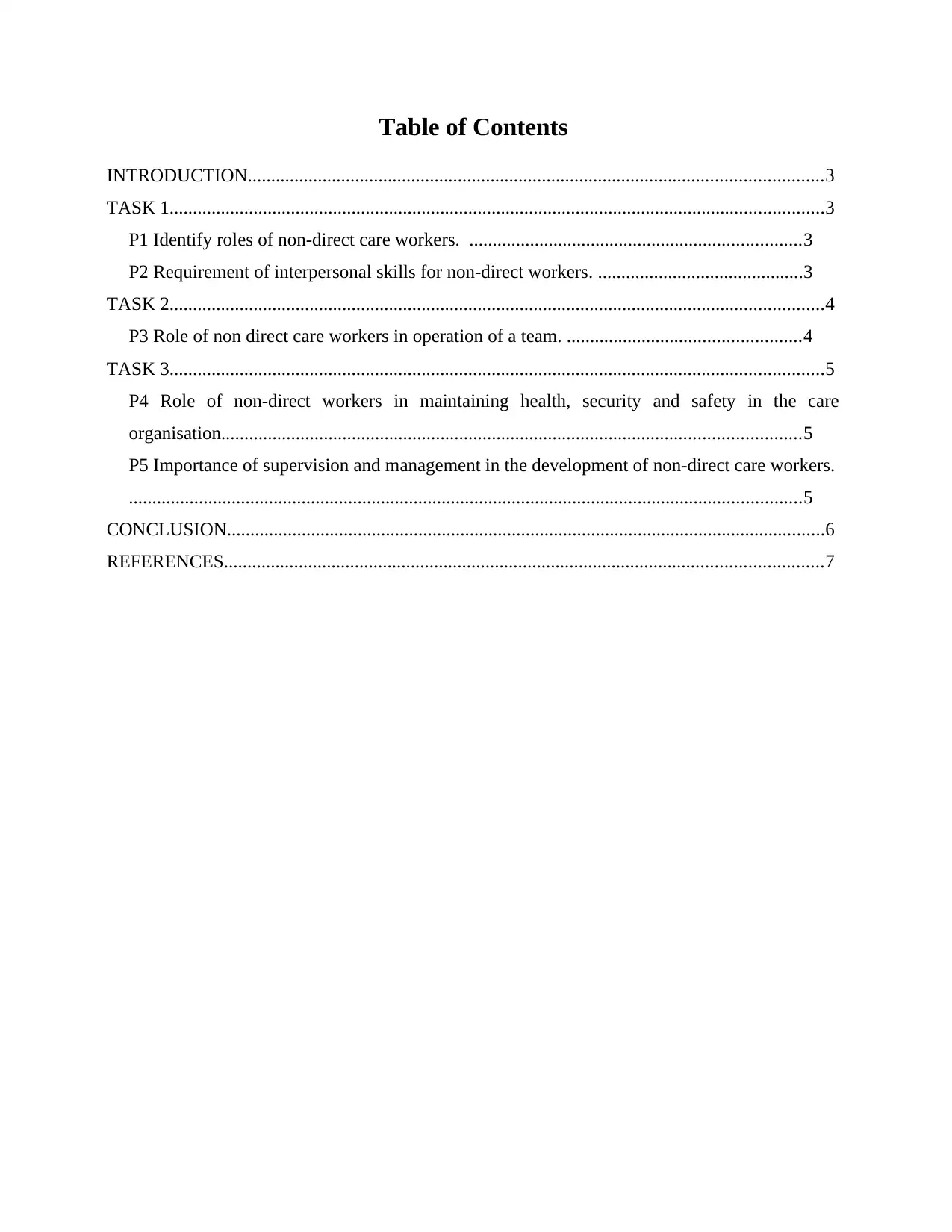
Table of Contents
INTRODUCTION...........................................................................................................................3
TASK 1............................................................................................................................................3
P1 Identify roles of non-direct care workers. .......................................................................3
P2 Requirement of interpersonal skills for non-direct workers. ............................................3
TASK 2............................................................................................................................................4
P3 Role of non direct care workers in operation of a team. ..................................................4
TASK 3............................................................................................................................................5
P4 Role of non-direct workers in maintaining health, security and safety in the care
organisation............................................................................................................................5
P5 Importance of supervision and management in the development of non-direct care workers.
................................................................................................................................................5
CONCLUSION................................................................................................................................6
REFERENCES................................................................................................................................7
INTRODUCTION...........................................................................................................................3
TASK 1............................................................................................................................................3
P1 Identify roles of non-direct care workers. .......................................................................3
P2 Requirement of interpersonal skills for non-direct workers. ............................................3
TASK 2............................................................................................................................................4
P3 Role of non direct care workers in operation of a team. ..................................................4
TASK 3............................................................................................................................................5
P4 Role of non-direct workers in maintaining health, security and safety in the care
organisation............................................................................................................................5
P5 Importance of supervision and management in the development of non-direct care workers.
................................................................................................................................................5
CONCLUSION................................................................................................................................6
REFERENCES................................................................................................................................7
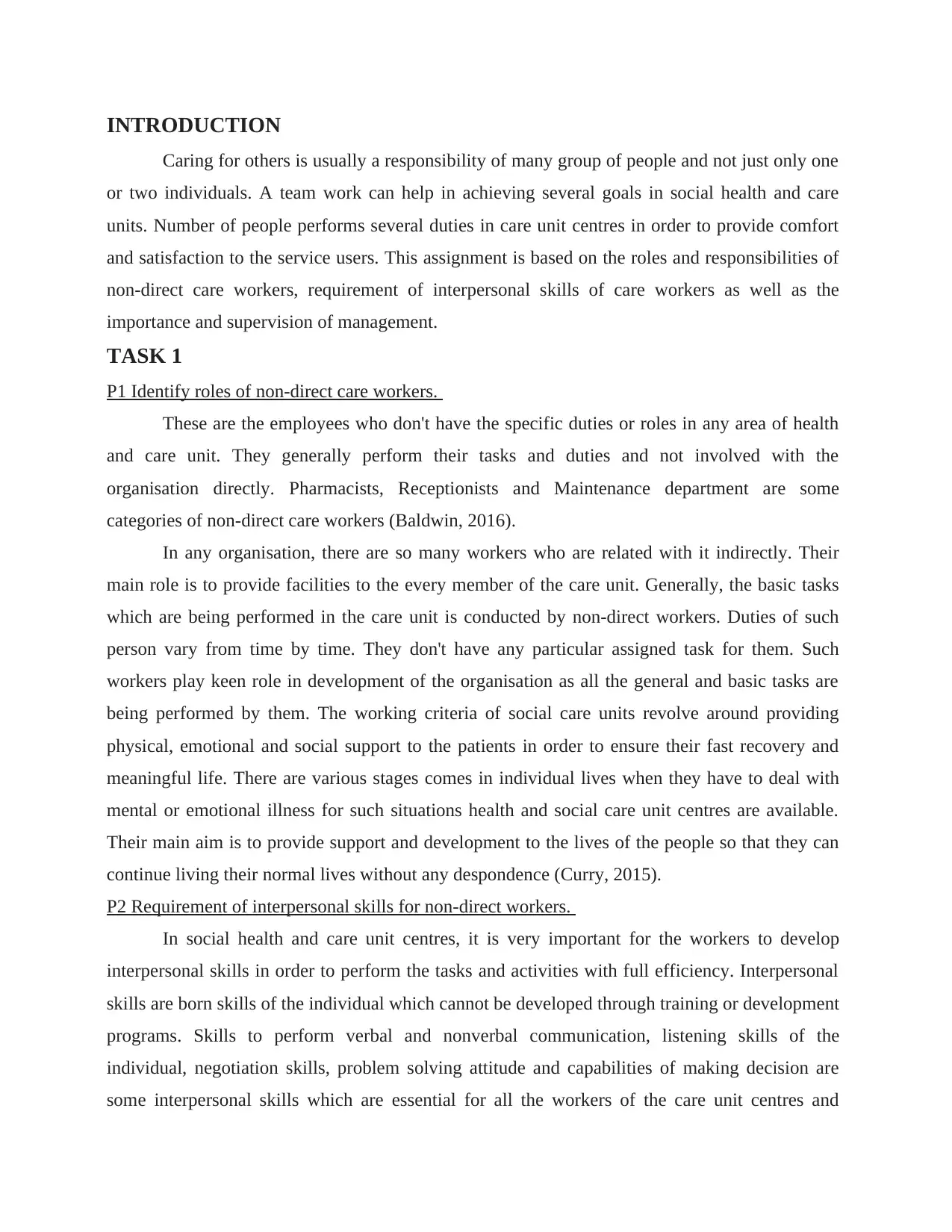
INTRODUCTION
Caring for others is usually a responsibility of many group of people and not just only one
or two individuals. A team work can help in achieving several goals in social health and care
units. Number of people performs several duties in care unit centres in order to provide comfort
and satisfaction to the service users. This assignment is based on the roles and responsibilities of
non-direct care workers, requirement of interpersonal skills of care workers as well as the
importance and supervision of management.
TASK 1
P1 Identify roles of non-direct care workers.
These are the employees who don't have the specific duties or roles in any area of health
and care unit. They generally perform their tasks and duties and not involved with the
organisation directly. Pharmacists, Receptionists and Maintenance department are some
categories of non-direct care workers (Baldwin, 2016).
In any organisation, there are so many workers who are related with it indirectly. Their
main role is to provide facilities to the every member of the care unit. Generally, the basic tasks
which are being performed in the care unit is conducted by non-direct workers. Duties of such
person vary from time by time. They don't have any particular assigned task for them. Such
workers play keen role in development of the organisation as all the general and basic tasks are
being performed by them. The working criteria of social care units revolve around providing
physical, emotional and social support to the patients in order to ensure their fast recovery and
meaningful life. There are various stages comes in individual lives when they have to deal with
mental or emotional illness for such situations health and social care unit centres are available.
Their main aim is to provide support and development to the lives of the people so that they can
continue living their normal lives without any despondence (Curry, 2015).
P2 Requirement of interpersonal skills for non-direct workers.
In social health and care unit centres, it is very important for the workers to develop
interpersonal skills in order to perform the tasks and activities with full efficiency. Interpersonal
skills are born skills of the individual which cannot be developed through training or development
programs. Skills to perform verbal and nonverbal communication, listening skills of the
individual, negotiation skills, problem solving attitude and capabilities of making decision are
some interpersonal skills which are essential for all the workers of the care unit centres and
Caring for others is usually a responsibility of many group of people and not just only one
or two individuals. A team work can help in achieving several goals in social health and care
units. Number of people performs several duties in care unit centres in order to provide comfort
and satisfaction to the service users. This assignment is based on the roles and responsibilities of
non-direct care workers, requirement of interpersonal skills of care workers as well as the
importance and supervision of management.
TASK 1
P1 Identify roles of non-direct care workers.
These are the employees who don't have the specific duties or roles in any area of health
and care unit. They generally perform their tasks and duties and not involved with the
organisation directly. Pharmacists, Receptionists and Maintenance department are some
categories of non-direct care workers (Baldwin, 2016).
In any organisation, there are so many workers who are related with it indirectly. Their
main role is to provide facilities to the every member of the care unit. Generally, the basic tasks
which are being performed in the care unit is conducted by non-direct workers. Duties of such
person vary from time by time. They don't have any particular assigned task for them. Such
workers play keen role in development of the organisation as all the general and basic tasks are
being performed by them. The working criteria of social care units revolve around providing
physical, emotional and social support to the patients in order to ensure their fast recovery and
meaningful life. There are various stages comes in individual lives when they have to deal with
mental or emotional illness for such situations health and social care unit centres are available.
Their main aim is to provide support and development to the lives of the people so that they can
continue living their normal lives without any despondence (Curry, 2015).
P2 Requirement of interpersonal skills for non-direct workers.
In social health and care unit centres, it is very important for the workers to develop
interpersonal skills in order to perform the tasks and activities with full efficiency. Interpersonal
skills are born skills of the individual which cannot be developed through training or development
programs. Skills to perform verbal and nonverbal communication, listening skills of the
individual, negotiation skills, problem solving attitude and capabilities of making decision are
some interpersonal skills which are essential for all the workers of the care unit centres and
⊘ This is a preview!⊘
Do you want full access?
Subscribe today to unlock all pages.

Trusted by 1+ million students worldwide
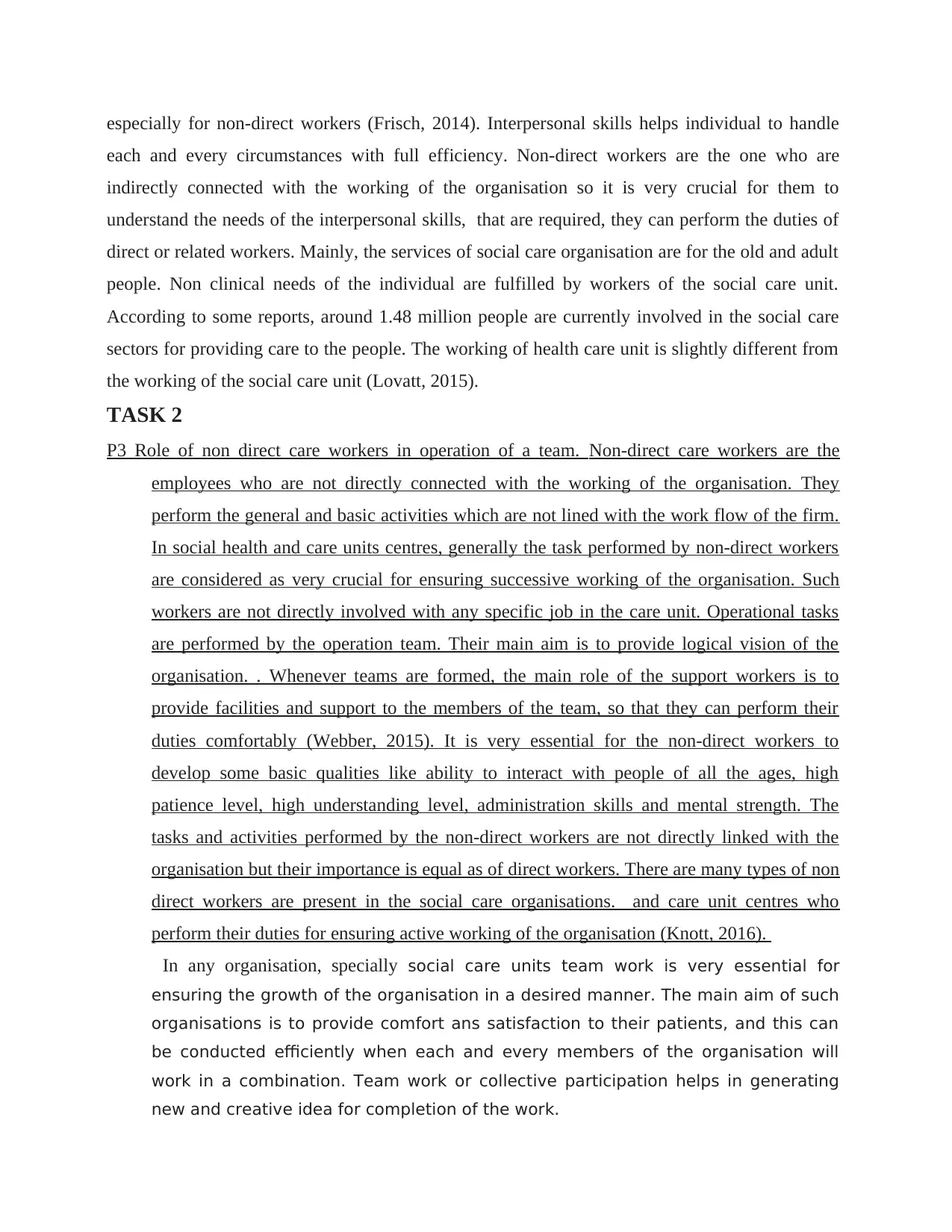
especially for non-direct workers (Frisch, 2014). Interpersonal skills helps individual to handle
each and every circumstances with full efficiency. Non-direct workers are the one who are
indirectly connected with the working of the organisation so it is very crucial for them to
understand the needs of the interpersonal skills, that are required, they can perform the duties of
direct or related workers. Mainly, the services of social care organisation are for the old and adult
people. Non clinical needs of the individual are fulfilled by workers of the social care unit.
According to some reports, around 1.48 million people are currently involved in the social care
sectors for providing care to the people. The working of health care unit is slightly different from
the working of the social care unit (Lovatt, 2015).
TASK 2
P3 Role of non direct care workers in operation of a team. Non-direct care workers are the
employees who are not directly connected with the working of the organisation. They
perform the general and basic activities which are not lined with the work flow of the firm.
In social health and care units centres, generally the task performed by non-direct workers
are considered as very crucial for ensuring successive working of the organisation. Such
workers are not directly involved with any specific job in the care unit. Operational tasks
are performed by the operation team. Their main aim is to provide logical vision of the
organisation. . Whenever teams are formed, the main role of the support workers is to
provide facilities and support to the members of the team, so that they can perform their
duties comfortably (Webber, 2015). It is very essential for the non-direct workers to
develop some basic qualities like ability to interact with people of all the ages, high
patience level, high understanding level, administration skills and mental strength. The
tasks and activities performed by the non-direct workers are not directly linked with the
organisation but their importance is equal as of direct workers. There are many types of non
direct workers are present in the social care organisations. and care unit centres who
perform their duties for ensuring active working of the organisation (Knott, 2016).
In any organisation, specially social care units team work is very essential for
ensuring the growth of the organisation in a desired manner. The main aim of such
organisations is to provide comfort ans satisfaction to their patients, and this can
be conducted efficiently when each and every members of the organisation will
work in a combination. Team work or collective participation helps in generating
new and creative idea for completion of the work.
each and every circumstances with full efficiency. Non-direct workers are the one who are
indirectly connected with the working of the organisation so it is very crucial for them to
understand the needs of the interpersonal skills, that are required, they can perform the duties of
direct or related workers. Mainly, the services of social care organisation are for the old and adult
people. Non clinical needs of the individual are fulfilled by workers of the social care unit.
According to some reports, around 1.48 million people are currently involved in the social care
sectors for providing care to the people. The working of health care unit is slightly different from
the working of the social care unit (Lovatt, 2015).
TASK 2
P3 Role of non direct care workers in operation of a team. Non-direct care workers are the
employees who are not directly connected with the working of the organisation. They
perform the general and basic activities which are not lined with the work flow of the firm.
In social health and care units centres, generally the task performed by non-direct workers
are considered as very crucial for ensuring successive working of the organisation. Such
workers are not directly involved with any specific job in the care unit. Operational tasks
are performed by the operation team. Their main aim is to provide logical vision of the
organisation. . Whenever teams are formed, the main role of the support workers is to
provide facilities and support to the members of the team, so that they can perform their
duties comfortably (Webber, 2015). It is very essential for the non-direct workers to
develop some basic qualities like ability to interact with people of all the ages, high
patience level, high understanding level, administration skills and mental strength. The
tasks and activities performed by the non-direct workers are not directly linked with the
organisation but their importance is equal as of direct workers. There are many types of non
direct workers are present in the social care organisations. and care unit centres who
perform their duties for ensuring active working of the organisation (Knott, 2016).
In any organisation, specially social care units team work is very essential for
ensuring the growth of the organisation in a desired manner. The main aim of such
organisations is to provide comfort ans satisfaction to their patients, and this can
be conducted efficiently when each and every members of the organisation will
work in a combination. Team work or collective participation helps in generating
new and creative idea for completion of the work.
Paraphrase This Document
Need a fresh take? Get an instant paraphrase of this document with our AI Paraphraser
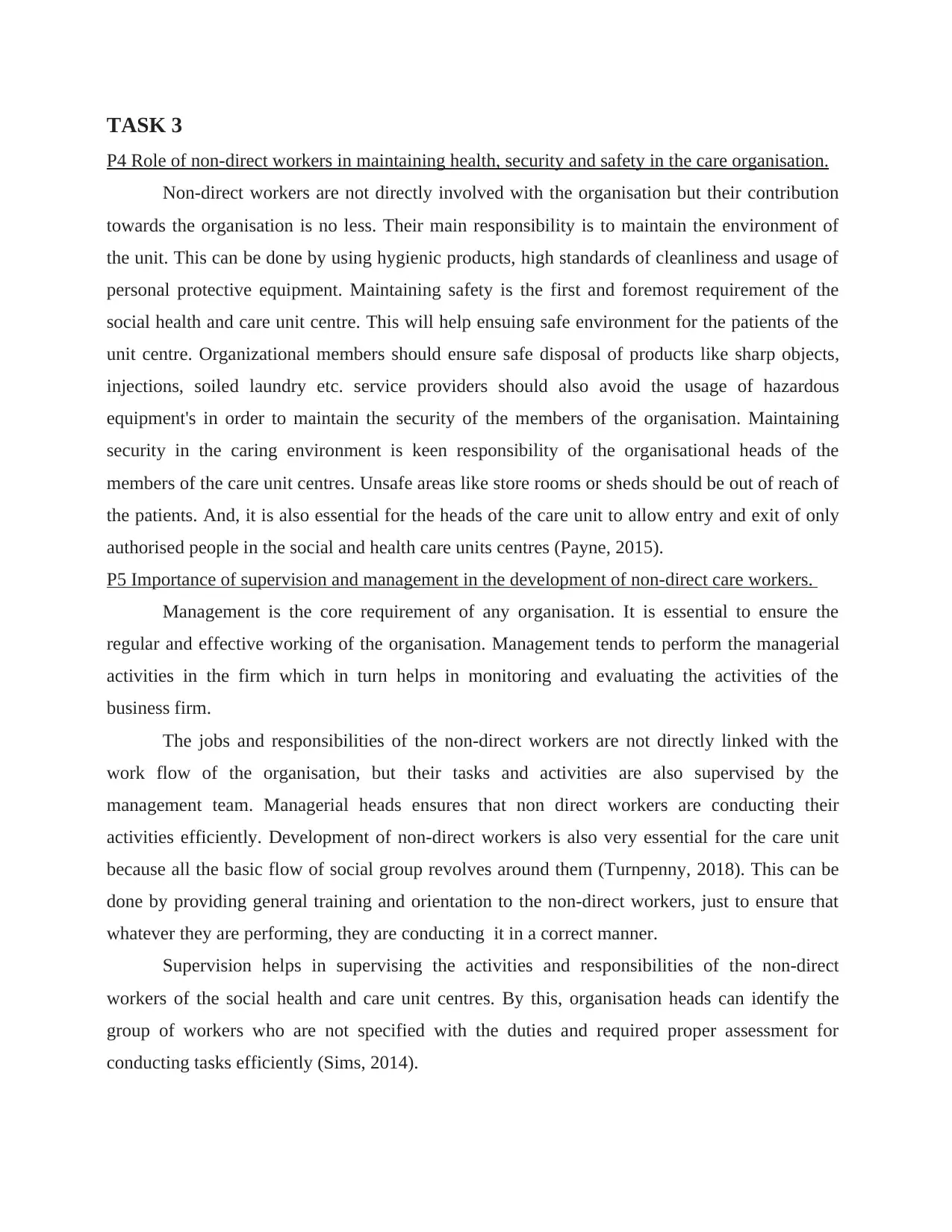
TASK 3
P4 Role of non-direct workers in maintaining health, security and safety in the care organisation.
Non-direct workers are not directly involved with the organisation but their contribution
towards the organisation is no less. Their main responsibility is to maintain the environment of
the unit. This can be done by using hygienic products, high standards of cleanliness and usage of
personal protective equipment. Maintaining safety is the first and foremost requirement of the
social health and care unit centre. This will help ensuing safe environment for the patients of the
unit centre. Organizational members should ensure safe disposal of products like sharp objects,
injections, soiled laundry etc. service providers should also avoid the usage of hazardous
equipment's in order to maintain the security of the members of the organisation. Maintaining
security in the caring environment is keen responsibility of the organisational heads of the
members of the care unit centres. Unsafe areas like store rooms or sheds should be out of reach of
the patients. And, it is also essential for the heads of the care unit to allow entry and exit of only
authorised people in the social and health care units centres (Payne, 2015).
P5 Importance of supervision and management in the development of non-direct care workers.
Management is the core requirement of any organisation. It is essential to ensure the
regular and effective working of the organisation. Management tends to perform the managerial
activities in the firm which in turn helps in monitoring and evaluating the activities of the
business firm.
The jobs and responsibilities of the non-direct workers are not directly linked with the
work flow of the organisation, but their tasks and activities are also supervised by the
management team. Managerial heads ensures that non direct workers are conducting their
activities efficiently. Development of non-direct workers is also very essential for the care unit
because all the basic flow of social group revolves around them (Turnpenny, 2018). This can be
done by providing general training and orientation to the non-direct workers, just to ensure that
whatever they are performing, they are conducting it in a correct manner.
Supervision helps in supervising the activities and responsibilities of the non-direct
workers of the social health and care unit centres. By this, organisation heads can identify the
group of workers who are not specified with the duties and required proper assessment for
conducting tasks efficiently (Sims, 2014).
P4 Role of non-direct workers in maintaining health, security and safety in the care organisation.
Non-direct workers are not directly involved with the organisation but their contribution
towards the organisation is no less. Their main responsibility is to maintain the environment of
the unit. This can be done by using hygienic products, high standards of cleanliness and usage of
personal protective equipment. Maintaining safety is the first and foremost requirement of the
social health and care unit centre. This will help ensuing safe environment for the patients of the
unit centre. Organizational members should ensure safe disposal of products like sharp objects,
injections, soiled laundry etc. service providers should also avoid the usage of hazardous
equipment's in order to maintain the security of the members of the organisation. Maintaining
security in the caring environment is keen responsibility of the organisational heads of the
members of the care unit centres. Unsafe areas like store rooms or sheds should be out of reach of
the patients. And, it is also essential for the heads of the care unit to allow entry and exit of only
authorised people in the social and health care units centres (Payne, 2015).
P5 Importance of supervision and management in the development of non-direct care workers.
Management is the core requirement of any organisation. It is essential to ensure the
regular and effective working of the organisation. Management tends to perform the managerial
activities in the firm which in turn helps in monitoring and evaluating the activities of the
business firm.
The jobs and responsibilities of the non-direct workers are not directly linked with the
work flow of the organisation, but their tasks and activities are also supervised by the
management team. Managerial heads ensures that non direct workers are conducting their
activities efficiently. Development of non-direct workers is also very essential for the care unit
because all the basic flow of social group revolves around them (Turnpenny, 2018). This can be
done by providing general training and orientation to the non-direct workers, just to ensure that
whatever they are performing, they are conducting it in a correct manner.
Supervision helps in supervising the activities and responsibilities of the non-direct
workers of the social health and care unit centres. By this, organisation heads can identify the
group of workers who are not specified with the duties and required proper assessment for
conducting tasks efficiently (Sims, 2014).
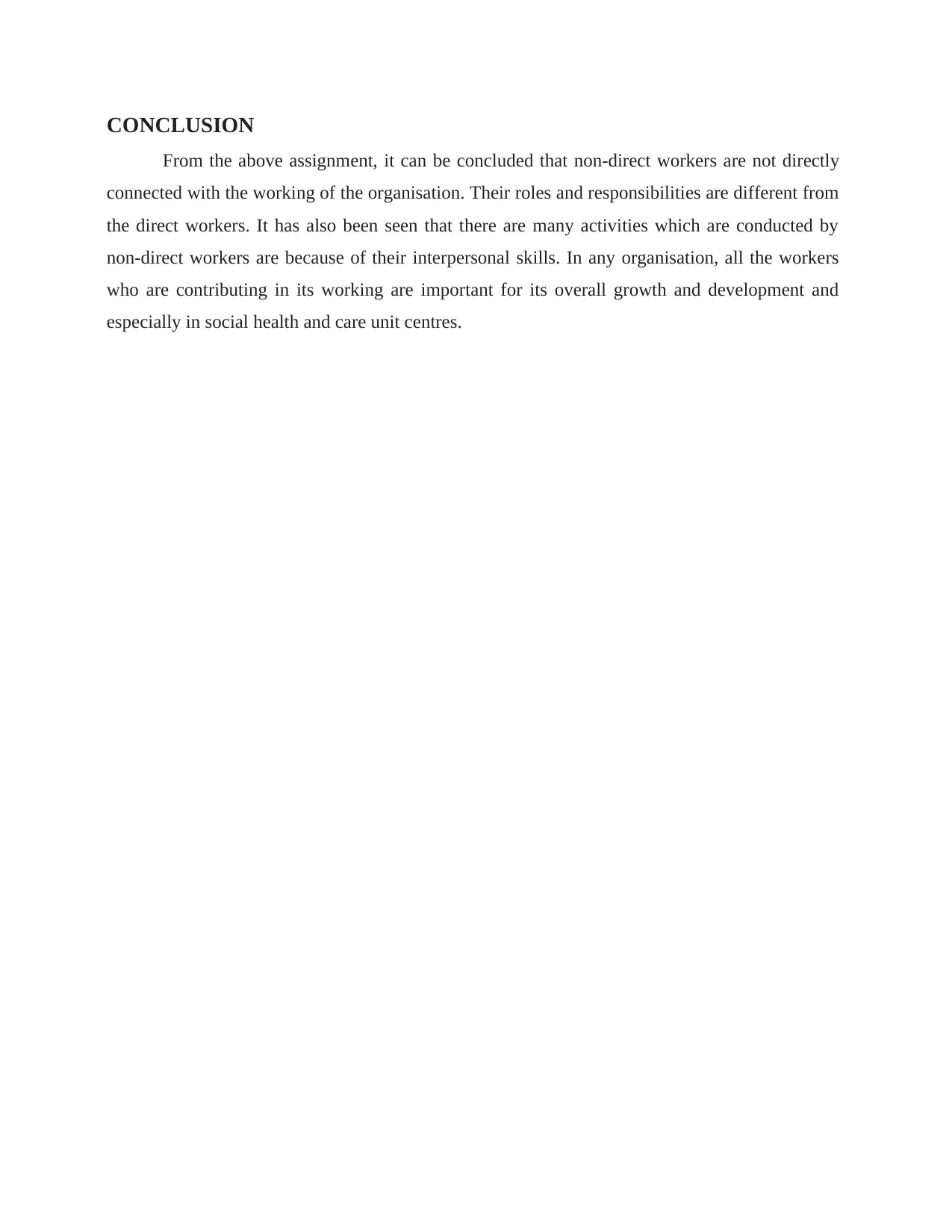
CONCLUSION
From the above assignment, it can be concluded that non-direct workers are not directly
connected with the working of the organisation. Their roles and responsibilities are different from
the direct workers. It has also been seen that there are many activities which are conducted by
non-direct workers are because of their interpersonal skills. In any organisation, all the workers
who are contributing in its working are important for its overall growth and development and
especially in social health and care unit centres.
From the above assignment, it can be concluded that non-direct workers are not directly
connected with the working of the organisation. Their roles and responsibilities are different from
the direct workers. It has also been seen that there are many activities which are conducted by
non-direct workers are because of their interpersonal skills. In any organisation, all the workers
who are contributing in its working are important for its overall growth and development and
especially in social health and care unit centres.
⊘ This is a preview!⊘
Do you want full access?
Subscribe today to unlock all pages.

Trusted by 1+ million students worldwide
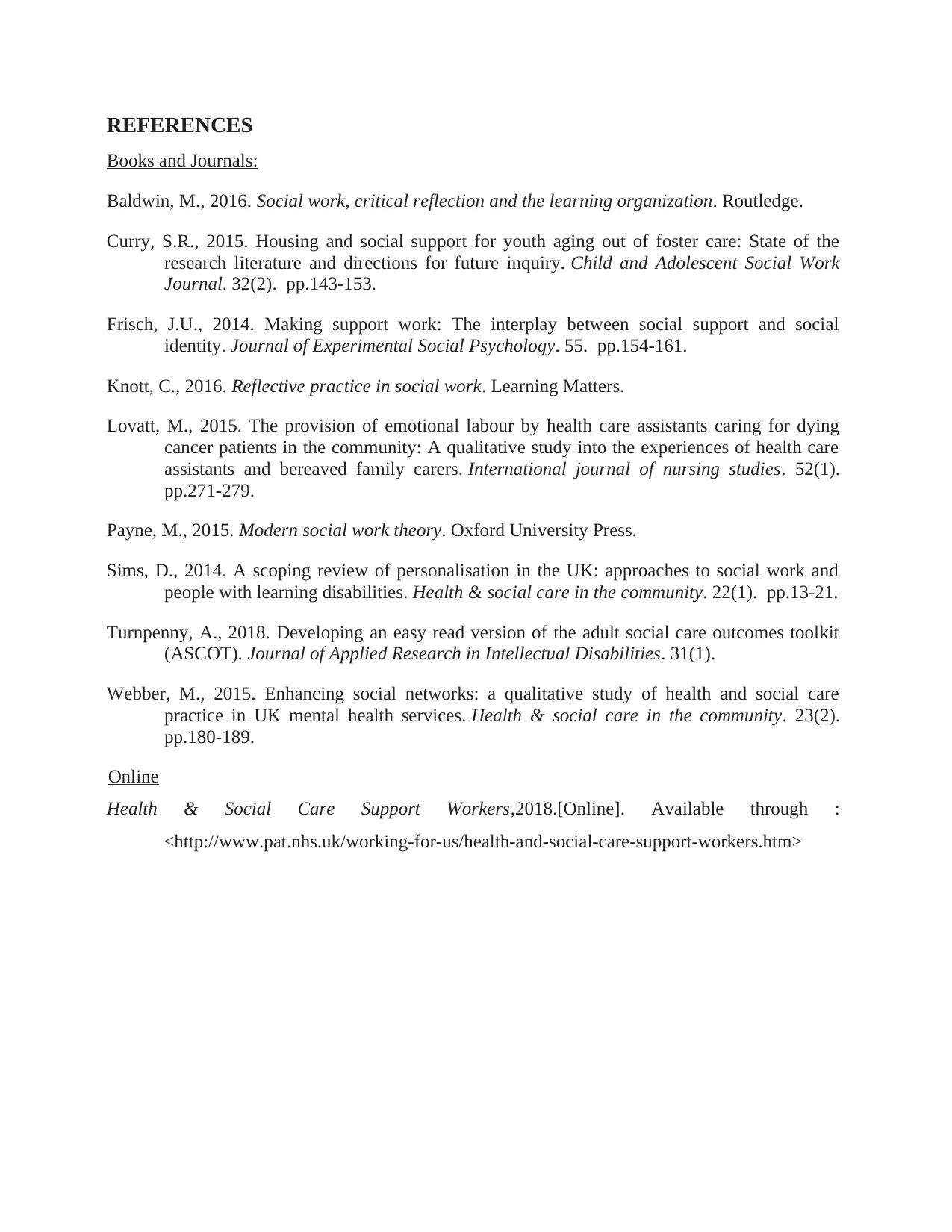
REFERENCES
Books and Journals:
Baldwin, M., 2016. Social work, critical reflection and the learning organization. Routledge.
Curry, S.R., 2015. Housing and social support for youth aging out of foster care: State of the
research literature and directions for future inquiry. Child and Adolescent Social Work
Journal. 32(2). pp.143-153.
Frisch, J.U., 2014. Making support work: The interplay between social support and social
identity. Journal of Experimental Social Psychology. 55. pp.154-161.
Knott, C., 2016. Reflective practice in social work. Learning Matters.
Lovatt, M., 2015. The provision of emotional labour by health care assistants caring for dying
cancer patients in the community: A qualitative study into the experiences of health care
assistants and bereaved family carers. International journal of nursing studies. 52(1).
pp.271-279.
Payne, M., 2015. Modern social work theory. Oxford University Press.
Sims, D., 2014. A scoping review of personalisation in the UK: approaches to social work and
people with learning disabilities. Health & social care in the community. 22(1). pp.13-21.
Turnpenny, A., 2018. Developing an easy read version of the adult social care outcomes toolkit
(ASCOT). Journal of Applied Research in Intellectual Disabilities. 31(1).
Webber, M., 2015. Enhancing social networks: a qualitative study of health and social care
practice in UK mental health services. Health & social care in the community. 23(2).
pp.180-189.
Online
Health & Social Care Support Workers,2018.[Online]. Available through :
<http://www.pat.nhs.uk/working-for-us/health-and-social-care-support-workers.htm>
Books and Journals:
Baldwin, M., 2016. Social work, critical reflection and the learning organization. Routledge.
Curry, S.R., 2015. Housing and social support for youth aging out of foster care: State of the
research literature and directions for future inquiry. Child and Adolescent Social Work
Journal. 32(2). pp.143-153.
Frisch, J.U., 2014. Making support work: The interplay between social support and social
identity. Journal of Experimental Social Psychology. 55. pp.154-161.
Knott, C., 2016. Reflective practice in social work. Learning Matters.
Lovatt, M., 2015. The provision of emotional labour by health care assistants caring for dying
cancer patients in the community: A qualitative study into the experiences of health care
assistants and bereaved family carers. International journal of nursing studies. 52(1).
pp.271-279.
Payne, M., 2015. Modern social work theory. Oxford University Press.
Sims, D., 2014. A scoping review of personalisation in the UK: approaches to social work and
people with learning disabilities. Health & social care in the community. 22(1). pp.13-21.
Turnpenny, A., 2018. Developing an easy read version of the adult social care outcomes toolkit
(ASCOT). Journal of Applied Research in Intellectual Disabilities. 31(1).
Webber, M., 2015. Enhancing social networks: a qualitative study of health and social care
practice in UK mental health services. Health & social care in the community. 23(2).
pp.180-189.
Online
Health & Social Care Support Workers,2018.[Online]. Available through :
<http://www.pat.nhs.uk/working-for-us/health-and-social-care-support-workers.htm>
1 out of 7
Related Documents
Your All-in-One AI-Powered Toolkit for Academic Success.
+13062052269
info@desklib.com
Available 24*7 on WhatsApp / Email
![[object Object]](/_next/static/media/star-bottom.7253800d.svg)
Unlock your academic potential
Copyright © 2020–2026 A2Z Services. All Rights Reserved. Developed and managed by ZUCOL.





